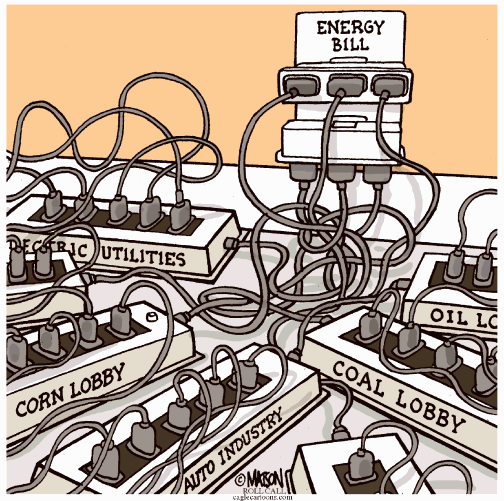 By JAY AMBROSE Scripps Howard News Service June 19, 2007
First off, you make sure you penalize domestic oil companies by raising their taxes and calling it an end of subsidies. This demagogic move will elicit cheers from people who don't understand the difference between gross profits (high) and profit margins (reasonable) while hurting the domestic industry in competition with the foreign industry and cutting back on exploration that could help bring oil prices down. Next, you cook up a provision mandating that utility companies produce 15 percent of their electricity with such renewable energy sources as wind and solar by 2020 even though trying would be excruciatingly expensive and likely unsuccessful. The technology just isn't there yet, and Congress can't change that with legislation, although it could look to nuclear energy to do considerably more of the heavy lifting.  Artist RJ Matson, Roll Call Distributed to subscribers for publication by Cagle Cartoons, Inc.
Third, you jack up fuel-economy standards in the auto industry, making it harder for Detroit to compete with the rest of the world, likely leading to vast numbers of layoffs, hiking the price of cars, making them smaller and less safe and doing somewhere between very little and not a lot to decrease gasoline consumption. The more miles per gallon you get in your car, the more you tend to drive, and the higher the price of your car, the longer you hang on to your old one, wise observers note. Fourth, you insist that ethanol will be part of the gasoline mix. Now maybe you've heard the experts explain that you produce ethanol by pumping carbon in the air, that it can be a third more expensive than gasoline on average and that -- wow, here is an opportunity -- it also raises the price of food. Why? Because mainly you make it with corn, and corn therefore becomes more in demand and more expensive whether you buy it in a grocery store or to feed livestock. The best ethanol source is the relatively cheap sugar-based variety from Brazil. Unfortunately, obtaining it for meaningful use here would entail lowering tariffs adored by a special interest on these shores, and we can't have that, can we? Fifth, you require the manufacturers of refrigerators, dishwashers and other appliances to make these products more "energy efficient," despite the probable consequence of also making them more expensive, less long-lasting and less reliable, as one analyst notes. The final energy savings? On the order of negligible. Sixth, you rule out further development of oil and natural-gas resources offshore or in Alaska as if there had been no significant improvements in safeguarding the environment in such undertakings and as if there were no need to quit relying so much on reserves in the Middle East. What you stringently avoid in all of this is making it look like you are responsible for the costs you inflict on the public. If you think carbon is taking us to an unbearably warm globe and that, even if it isn't, we need to dissuade people from using so much oil for a long list of geopolitical and other reasons, you maybe come up with a gasoline or carbon tax, perhaps spurring technological innovations by entrepreneurs. Instead, you arrange it so that the higher costs you impose will be blamed on automakers, oil companies, utility companies and any other scapegoat you can find. Then, when your awful bill is done and maybe passed with some Republican collaboration, you look at your creation, call it good and then go to work hurting the nation in other ways. (Jay Ambrose, formerly Washington
director of editorial policy for Scripps Howard newspapers and
the editor of dailies in El Paso, Texas, and Denver, is a columnist
living in Colorado. He can be reached at SpeaktoJay(at)aol.com.) Distributed to subscribers for publication by Scripps Howard News Service, http://www.scrippsnews.com
|